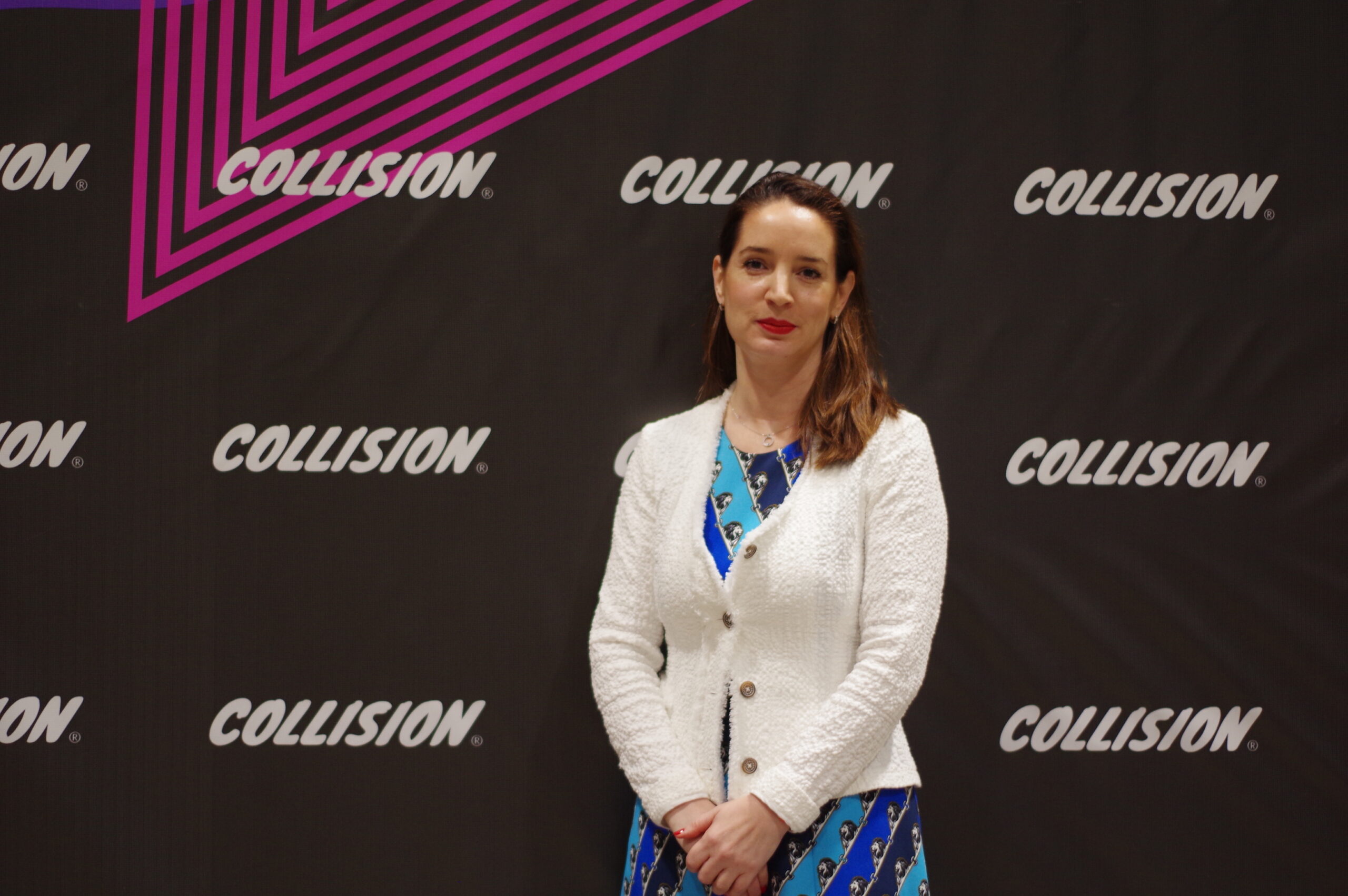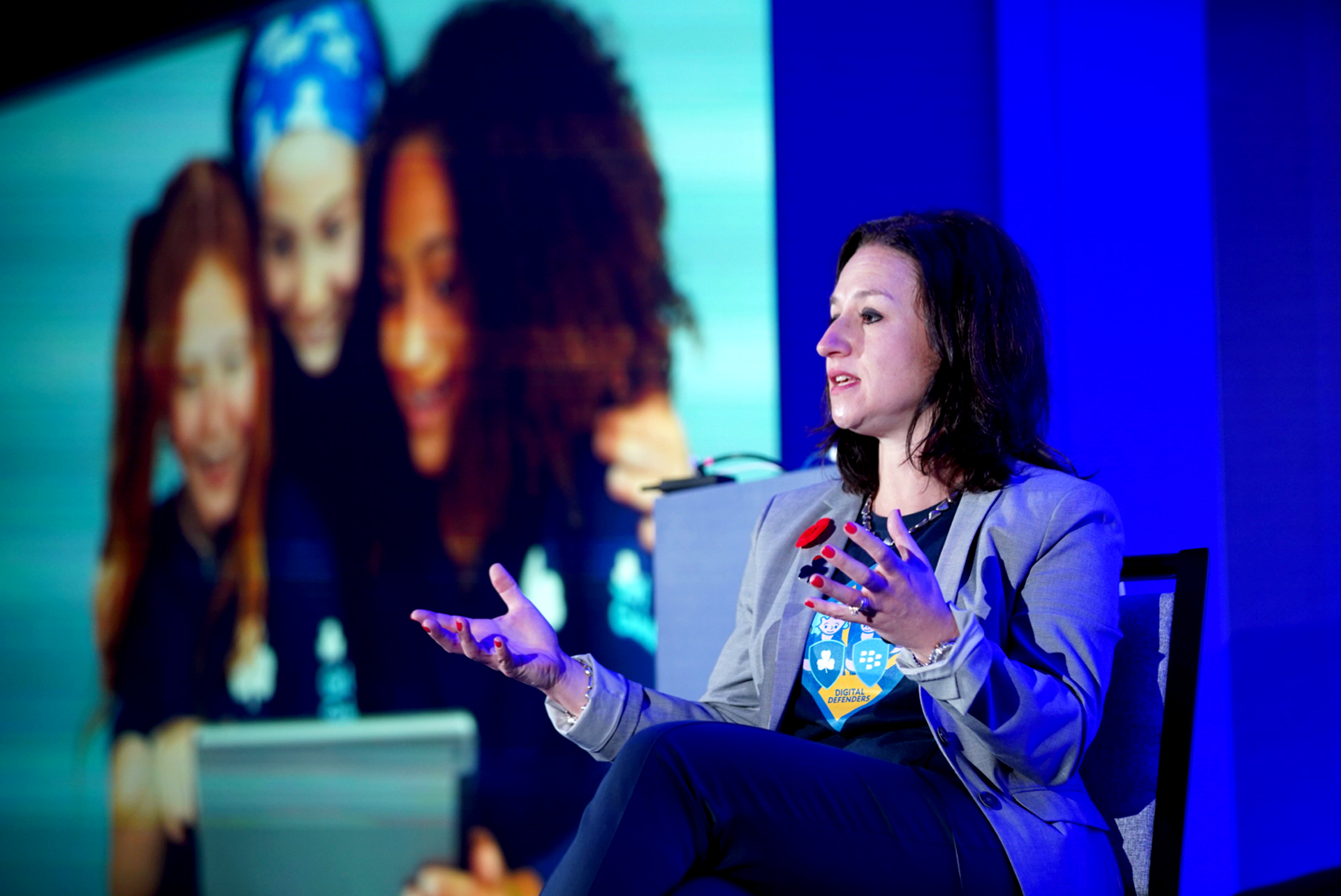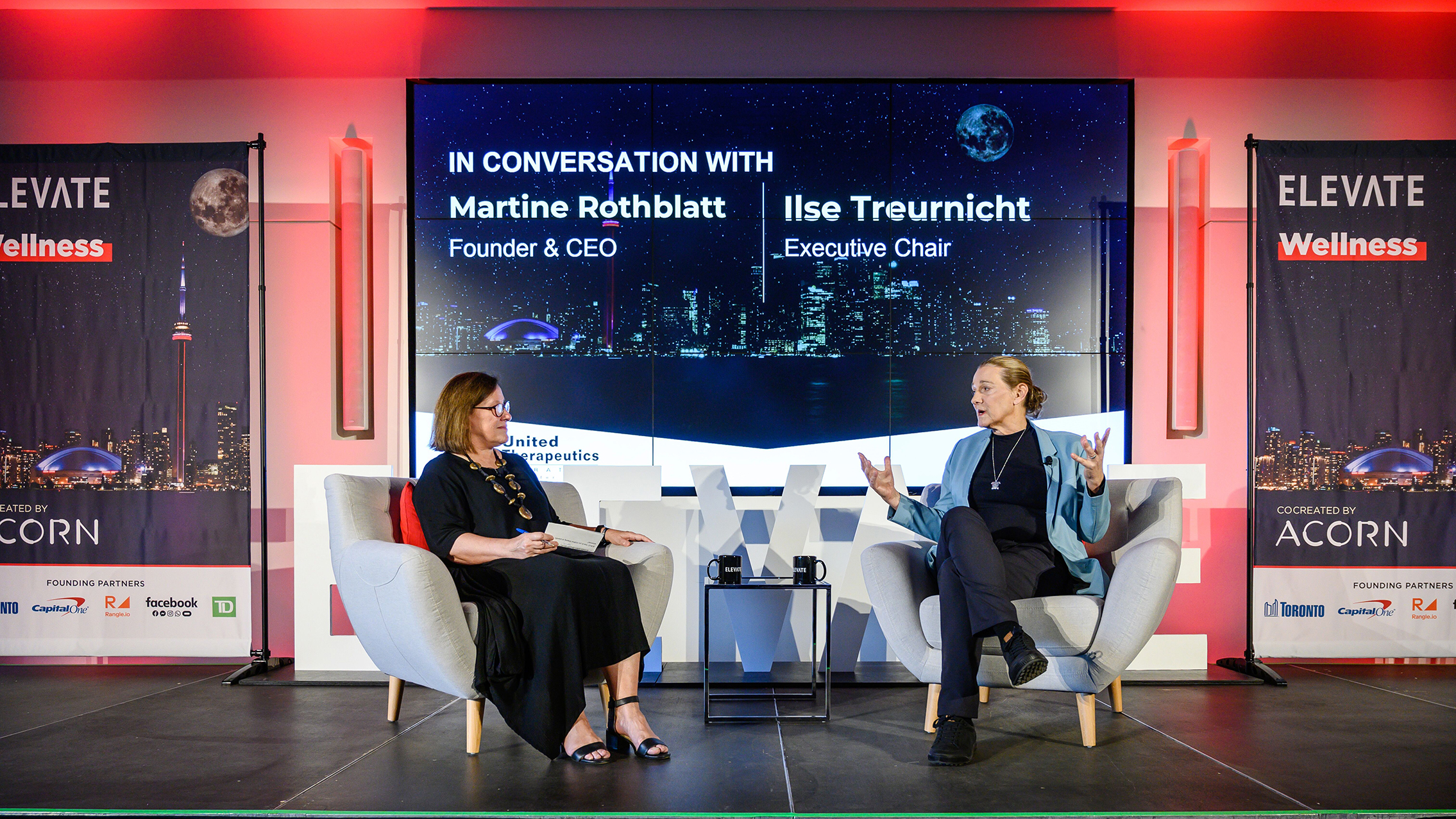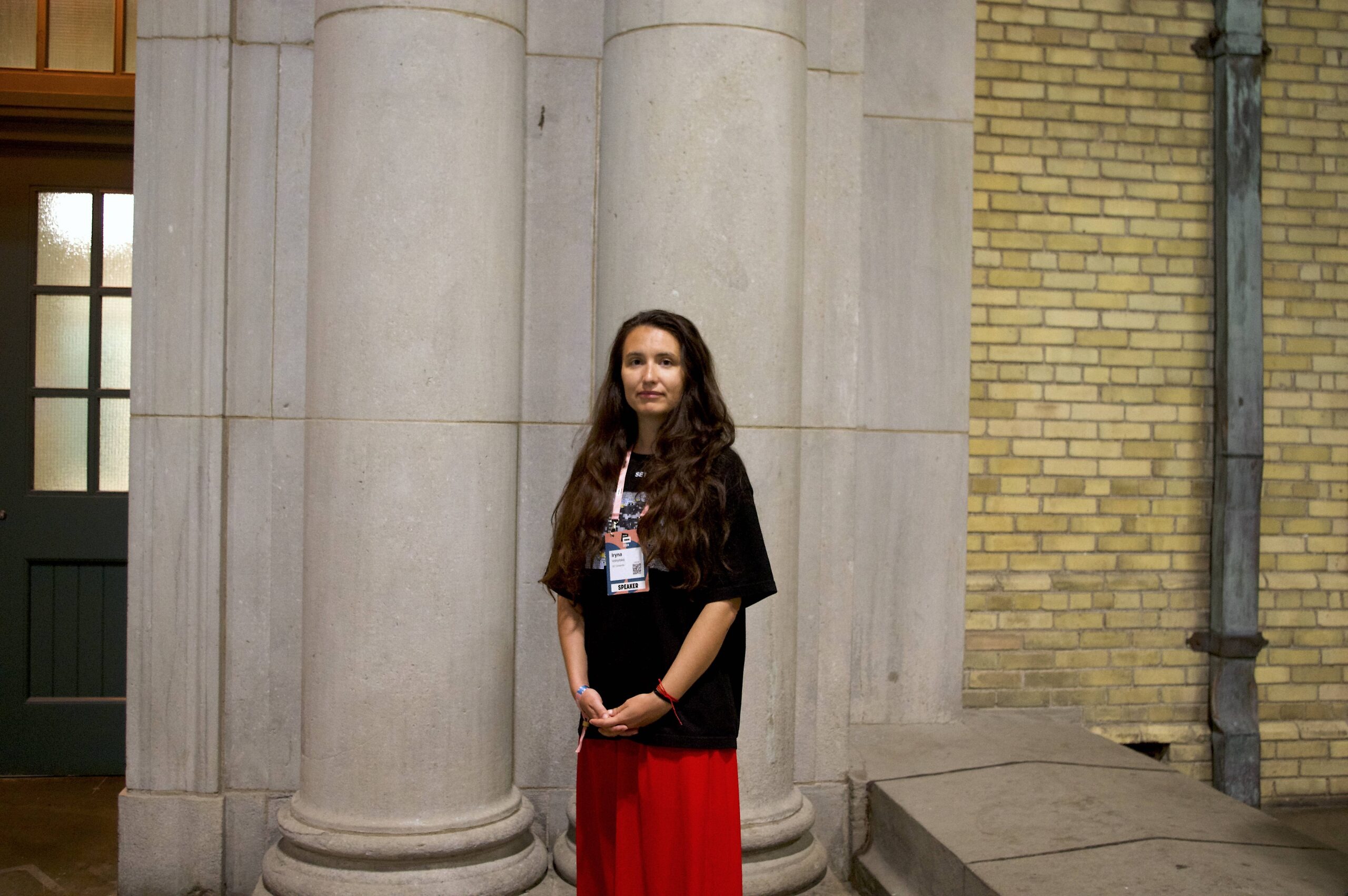
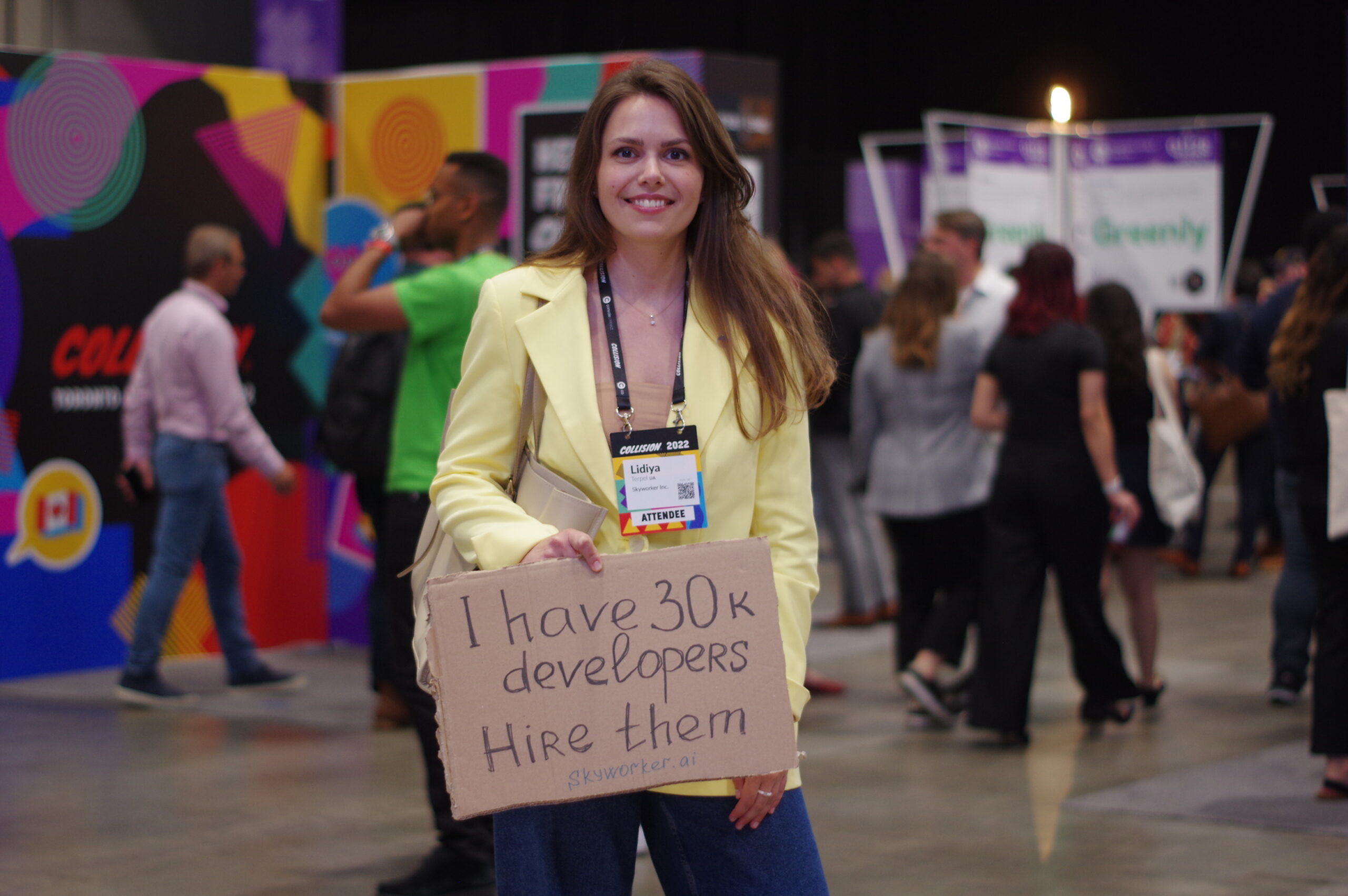
Imagine creating a startup and then a war breaks out in your home country. Then you move to an underground shelter, only to move to another city and eventually settle in another country where you reconvene with fellow co-workers, all the while trying to keep the startup alive. How's that for the start of your fiscal year? That's exactly what happened to the CEO and co-founder of Skyworker.ai
After leaving Collision’s Media Lounge, I notice someone holding up a cardboard sign, the kind held by a chauffeur at an airport pickup, by panhandlers, or perhaps, a refugee.
The sign was difficult to read at first, but the image of her holding it was unmistakable. Set against the backdrop of one of North America’s largest tech conferences, Collision Conference—where thousands of business reps share their startup stories while VCs search for the next big thing—this entrepreneur stood out from the frenzied crowd.
As I walk in her direction I introduce myself. Her name is Lidiya Terpel, she is neither panhandling nor chauffeuring anyone from the conference. Terpel is CEO at Skyworker.ai, a one-stop shop for tech personnel recruitment. As she puts it, “It’s like Tinder but for recruiting”. I tell her I think the name of her company is clever and memorable, unlike many of the startup names that are easily forgettable these days or impossible to pronounce.
I quickly learn that Terpel, although cleverly marketing herself and her company, is at the conference on her birthday. She then proceeds to tell me a bit of her recent backstory; in short, she is a refugee of the Russian war in Ukraine. Behind that beaming smile is a founder obsessing over her company, employees, the uncertainties in her country, and someone who struggles with guilt as she sees herself fortunate enough to attend the conference in Toronto while so much turmoil persists back home.

Before the onset of war, Skyworker was founded and based in Kyiv. She and many of the company’s core employees soon headed west over the Ukrainian border eventually landing where opportunity allowed. In time, most of them landed in Warsaw, Poland. This is where the story of Skyworker takes a resilient turn and where it currently continues its operations.
In essence, this is a story of survival. It’s what makes business and startups so personal; going beyond bottomlines and corporate coldness, the fight to keep Skyworker a success crosses borders and many, many hearts. This is about keeping a part of Ukraine alive as it absorbs constant bombardment, and it couldn’t have been possible without its gracious and understanding neighbours.
Terpel, as her voice cracks with emotion, explains how Poland and its people made it possible for Skyworker.ai to continue despite all the extenuating circumstances.
Regarding the treatment she received soon after arriving in Poland, Terpal—a devout patriot and lover of her Ukrainian homeland—posted an article that she says went viral with the hashtag “for_ my_new_Polish_friends”. Filled with gratitude, it is a post deserving of being shared again here.
Details to the extent of how the Poles have and continue to assist—each contribution like twigs entwining the nest she currently calls home—shows the complicating factors that are feeding a collective eastern-European resistance. The commentary section under the post illustrates the range of emotions from Poles and Ukrainians alike, with an enthusiasm akin to long-separated but now reunited family members. Without these contributions, Terpel’s fortitude (as steady and tempered as it is) and the company’s existence, may not have endured the bomb blasts, the dispersions, and the overall destruction of war.
With a sense of pride, she tells me that the Polish and Ukrainian languages have more similarities to each other than the Ukrainian and Russian languages. She and her colleagues are now picking up the Polish language with computer-like acumen and speed, knowing that their stay in Warsaw is indefinite, but also as a courtesy, extending their appreciation as guests to their hosts by immersing themselves in the Polish culture.
Repeatedly, Terpel shares with me that she is filled with guilt for having fled her country as a means of survival; and as others stay and fight, she’s given the opportunity to continue her dream of propelling Skyworker, co-founded with Oleksandra Bernatska who is also the company’s Chief Product Officer (pictured below).

The feeling of guilt is so strong that it overshadows the obvious argument that she is the reason why Ukrainians fight: so that Ukrainians can prosper in a free land without further hindrance toward their socio-economic desires, leaders and democratic processes. She fights the inner-demons of what she might deem as the abandonment of her homeland in its greatest time of need, while now given the opportunity to travel and attend her first Collision Conference on hurried visas with a pair of colleagues.
Speaking with Terpel one feels the depth of mixed emotions that overwhelms her while visiting Toronto. Her mind, she says, endlessly spins regarding how to make Skyworker a success, but also to have it survive its most difficult days. Because of the war, “Many startups in Ukraine have ended” she says. She knows that outcome could be a possibility for Skyworker, too, amidst the unprecedented assault on her country. On the other hand, her heart is with her family and the country she loves and will always call home.

These are happier days for the team while they visit the safe and embracing confines of Canada. But Terpel is fully aware that the conference is but a blip in her fiscally focused year. We had but a brief moment to continue post-conference an interview regarding Skyworker and its potential obstacles and/or highlights.
Skyworker, like Tinder, allows for a company to swipe right to initiate an interview between recruiters and candidates. The platform has 30K+ active candidates with 800+ companies (including the U.S., U.K., Israel et al.) both in app and web version form. The European market has been growing for Skyworker exponentially after starting in Ukraine. Terpel went alone to WebSummit in Spain in 2019 in hopes to get investors, but armed only with an idea the net result was mostly one of experience rather than investor interest. However, Terpel met Skyworker’s current CTO on the flight back to Kyiv from Lisbon, which resulted, in part, the first Skyworker product that would launch, but with a fizzle, mostly related to the pandemic. It was a difficult time and recruiting wasn’t active, Terpal says, so the first solid iteration of their product, which was based on the content of what companies would provide, ended with less-than-desirable results.
A handful of the Skyworker team soon brainstormed a new business model and product. They decided they would have their own currency for interviews (different per cost/use); this pay-per-interview model is “like Google Adwords inside our own recruiting platform” says Terpel. At the start, Ukraine made a terrific testing ground for Skyworker, with 200K+ tech specialists, developers and engineers, it represented a “cool launch market for us, and companies from all of the world […] hired Ukrainians.”
However, the company’s most difficult time came soon after. It was with the onset of war where Skyworker would then see an approximate drop of around 70% of companies “within the first two weeks” who were now unwilling to hire tech specialists from the Ukrainian market. The uncertainty around security and whether their product would be in danger in the hands of someone in an occupied territory made companies averse to any recruiting propositions. This is when the company and its employees uprooted and would later land in Warsaw, Poland.
Terpel was the first to move to Warsaw and find a flat. She then compelled co-workers to join her. The core of the group arrived soon after, Ola and Oleksandra being the first, while the males of the company, especially of fighting age, could only move as far west inside Ukraine as possible to stay clear of bombardments.
It was here that Poland’s embrace breathed additional life to Skyworker when a VC fund and its partners aided in strategizing to expand into newer markets including Poland. One of their focuses was to also make it a “more interesting startup to invest in for the future” which likely means expanding beyond concentrated borders of central and eastern Europe.
With the help of the Polish VC fund, the Skyworker platform is now even more robust with additional capital while also shepherding new ideas for where to take the company. From here, Terpel, Bernatska and Kapinos, found their way to Collision Conference in Toronto as a way to broaden their reach.
Terpel’s stop in Toronto for Collision Conference was a way to extend the brand, to get noticed and promote the talents of eastern European tech workers beyond the continent. Her guilt, however, was continually apparent during our interview:
“Since moving to Poland, I’ve had a feeling of guilt. I understood by growing this business, I help them [employees] to have a salary, which they use for their life, but also I have this feeling that other Ukrainians haven’t this possibility of being abroad to build businesses. A lot of my friends, founders of startups, posted during these last three months, that they decided to close their startups because they haven’t the money […] their ideas died. I decided to fight for our idea and in such case support Ukraine also because I think that the more successful our startup will be the more options I will have to donate to the Ukrainian army, and I think it’s very important—supporting refugees is very important—but first of all for me it’s important to support the guys who are in the army now, because they haven’t a lot of stuff, sometimes they fight in blazers without helmets.”
Each month Terpel and friends gather money for the cause, to get helmets or other much-needed supplies to the frontlines.
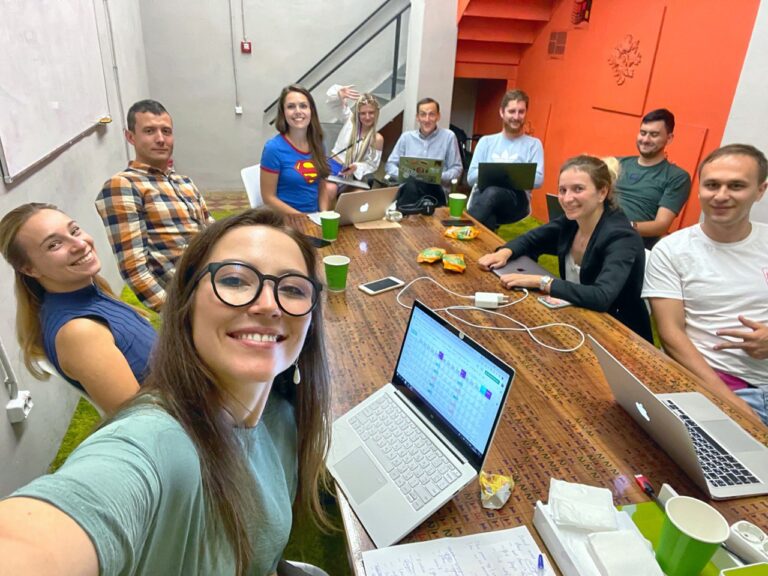
After leaving Toronto this summer and returning to the NATO-protected borders of Poland, Terpel was soon met with terrible news of a bomb striking a mall in Kremenchuk. She writes back to tell me of the horrifying news, and how her thoughts on our interview should be less about her company and more about the tragedies and trials of living under this war.
I obliged to continue the conversation, but not in such a way to undermine the notion that her company is above water and helping developers of eastern Europe find work for companies across the globe.
Hiring through Skyworker would be a way to help donate and rebuild what’s been lost to those who have lost everything or to those, particularly people in countries like Poland, who have opened their doors to millions. That is to say, if one is part of a company looking for tech workers—most of whom are fluent in English, technically sound and are trying to survive on the move—and want to contribute to a cause at the same time, Skyworker might be the place to outsource some of those human resources.
The Skyworker story is just beginning, and only time will tell where the company ends up and whether they can persevere through the tribulations of a pandemic, war, relocations and a new product design. So far, things are still on track despite these trials as they grow their market westward, away from the shelling and Russian offensives, but also with a heavy heart.
[Expect a follow-up article in a year’s time.]


